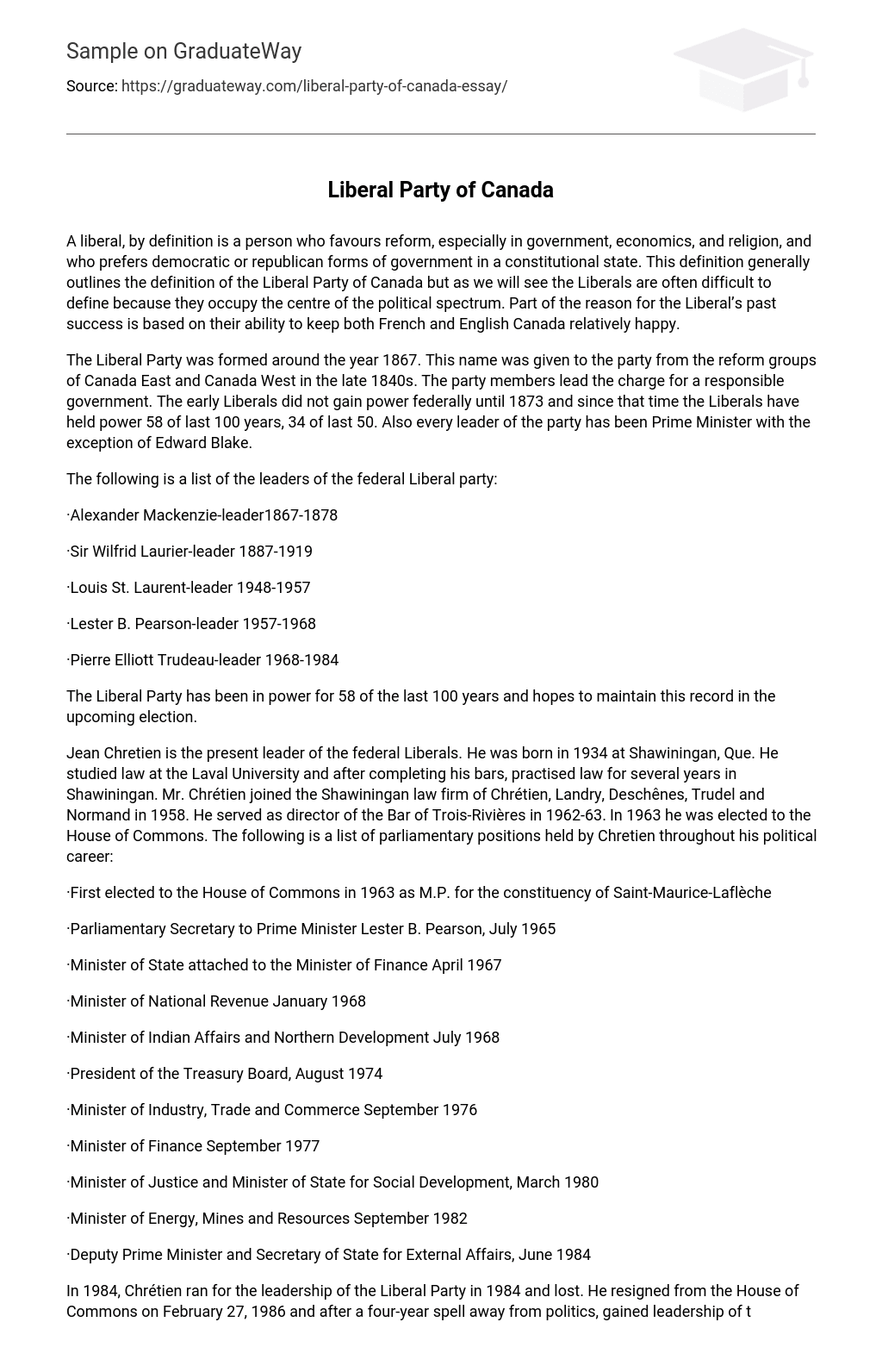A liberal, by definition is a person who favours reform, especially in government, economics, and religion, and who prefers democratic or republican forms of government in a constitutional state. This definition generally outlines the definition of the Liberal Party of Canada but as we will see the Liberals are often difficult to define because they occupy the centre of the political spectrum. Part of the reason for the Liberal’s past success is based on their ability to keep both French and English Canada relatively happy.
The Liberal Party was formed around the year 1867. This name was given to the party from the reform groups of Canada East and Canada West in the late 1840s. The party members lead the charge for a responsible government. The early Liberals did not gain power federally until 1873 and since that time the Liberals have held power 58 of last 100 years, 34 of last 50. Also every leader of the party has been Prime Minister with the exception of Edward Blake.
The following is a list of the leaders of the federal Liberal party:
- Alexander Mackenzie-leader1867-1878
- Sir Wilfrid Laurier-leader 1887-1919
- Louis St. Laurent-leader 1948-1957
- Lester B. Pearson-leader 1957-1968
- Pierre Elliott Trudeau-leader 1968-1984
The Liberal Party has been in power for 58 of the last 100 years and hopes to maintain this record in the upcoming election.
Jean Chretien is the present leader of the federal Liberals. He was born in 1934 at Shawiningan, Que. He studied law at the Laval University and after completing his bars, practised law for several years in Shawiningan. Mr. Chrétien joined the Shawiningan law firm of Chrétien, Landry, Deschênes, Trudel and Normand in 1958. He served as director of the Bar of Trois-Rivières in 1962-63. In 1963 he was elected to the House of Commons.
The following is a list of parliamentary positions held by Chretien throughout his political career:
- First elected to the House of Commons in 1963 as M.P. for the constituency of Saint-Maurice-Laflèche
- Parliamentary Secretary to Prime Minister Lester B. Pearson, July 1965
- Minister of State attached to the Minister of Finance April 1967
- Minister of National Revenue January 1968
- Minister of Indian Affairs and Northern Development July 1968
- President of the Treasury Board, August 1974
- Minister of Industry, Trade and Commerce September 1976
- Minister of Finance September 1977
- Minister of Justice and Minister of State for Social Development, March 1980
- Minister of Energy, Mines and Resources September 1982
- Deputy Prime Minister and Secretary of State for External Affairs, June 1984
In 1984, Chrétien ran for the leadership of the Liberal Party in 1984 and lost. He resigned from the House of Commons on February 27, 1986 and after a four-year spell away from politics, gained leadership of the Liberal Party on June 23, 1990. He was elected once again elected to the House of Commons on December 10, 1990, by means of a by-election in the riding of Beauséjour (New Brunswick). He was sworn in as Leader of the Opposition in the House of Commons on December 21, 1990. Chretien was then re-elected on October 25, 1993 and his party formed a majority government in which he was the Prime Minister.
The Liberal Party in the 2000 Election. At the time parliament was dissolved, the Liberals held 161 of 301 seats in the House of Commons. The Liberal’s main opponent in this election will be the newly formed Canadian Alliance. The Party is facing strong criticism in its decision to call an election with several years still remaining in their political term.





